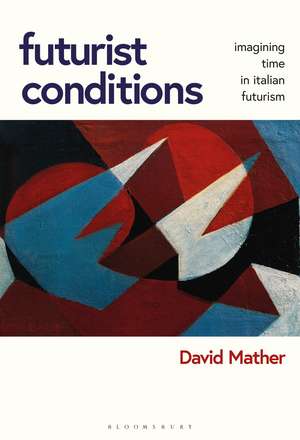Futurist Conditions: Imagining Time in Italian Futurism
Autor David Matheren Limba Engleză Paperback – 8 feb 2023
Preț: 169.83 lei
Preț vechi: 217.59 lei
-22% Nou
Puncte Express: 255
Preț estimativ în valută:
32.50€ • 33.81$ • 26.83£
32.50€ • 33.81$ • 26.83£
Carte disponibilă
Livrare economică 24 martie-07 aprilie
Preluare comenzi: 021 569.72.76
Specificații
ISBN-13: 9781350282773
ISBN-10: 1350282774
Pagini: 240
Ilustrații: 20 colour and 40 bw illus
Dimensiuni: 156 x 234 x 18 mm
Greutate: 0.54 kg
Editura: Bloomsbury Publishing
Colecția Bloomsbury Visual Arts
Locul publicării:London, United Kingdom
ISBN-10: 1350282774
Pagini: 240
Ilustrații: 20 colour and 40 bw illus
Dimensiuni: 156 x 234 x 18 mm
Greutate: 0.54 kg
Editura: Bloomsbury Publishing
Colecția Bloomsbury Visual Arts
Locul publicării:London, United Kingdom
Caracteristici
Although the Italian futurists embraced industrial technologies, the important figure of Umberto Boccioni was also resistant to the idea of permitting mechanical imagery to be used creatively
Notă biografică
David Mather is an art historian of early twentieth-century and interwar European art. He lives and works in Southern California, USA.
Cuprins
List of PlatesList of FiguresAcknowledgementsIntroduction: Temporal Imagination1. The Bragaglias' Unreality2. Balla's Transformation3. Boccioni's Body-BuildingsConclusion: Collective ConditionIndex
Recenzii
David Mather's Futurist Conditions is an essential contribution to the study of Italian Futurism. Replacing the machine with the camera and temporal contingency as central themes, Mather produces highly original new readings of well-known Futurist works, including Boccioni's Unique Forms.
Offering a fresh perspective on Italian futurism, David Mather argues that critics have overplayed the movement's reputed interest in the destructive effects of technology. It was through the camera that futurists turned towards more spiritual aims. Utilizing Giacomo Balla and Umberto Boccioni as exemplars, Mather imaginatively rethinks their inventions through the lens of photography.
With exceptional care and concern, David Mather offers us a brilliant yet moving eulogy for modern art by revealing the violent creativity of a future fixated on the past and the deep wrinkles connecting art and technology with authoritarianism and reactionary politics.
Offering a fresh perspective on Italian futurism, David Mather argues that critics have overplayed the movement's reputed interest in the destructive effects of technology. It was through the camera that futurists turned towards more spiritual aims. Utilizing Giacomo Balla and Umberto Boccioni as exemplars, Mather imaginatively rethinks their inventions through the lens of photography.
With exceptional care and concern, David Mather offers us a brilliant yet moving eulogy for modern art by revealing the violent creativity of a future fixated on the past and the deep wrinkles connecting art and technology with authoritarianism and reactionary politics.
